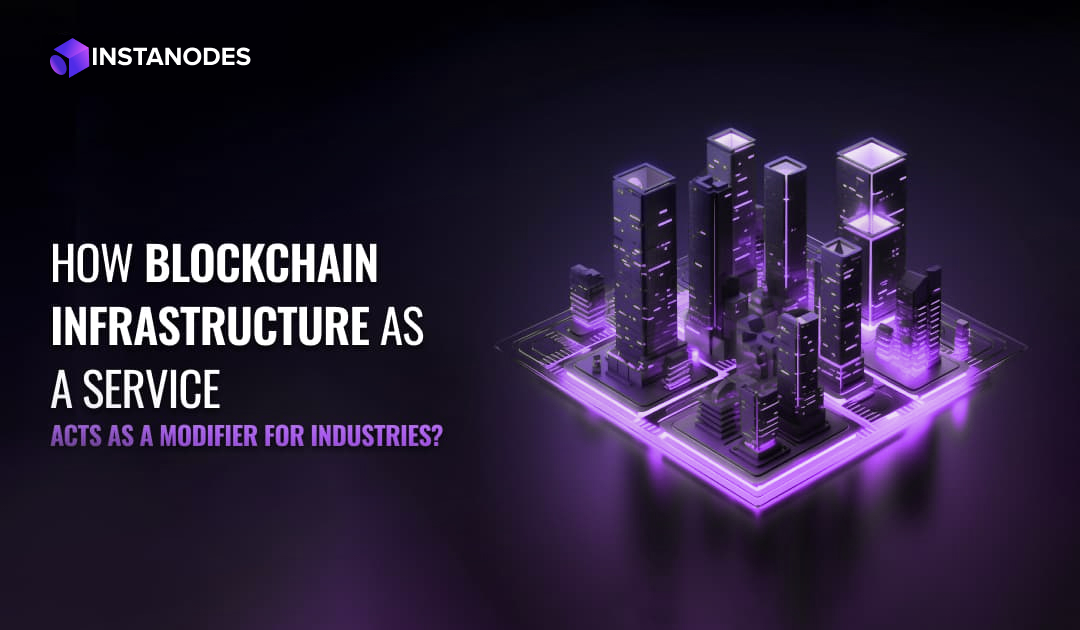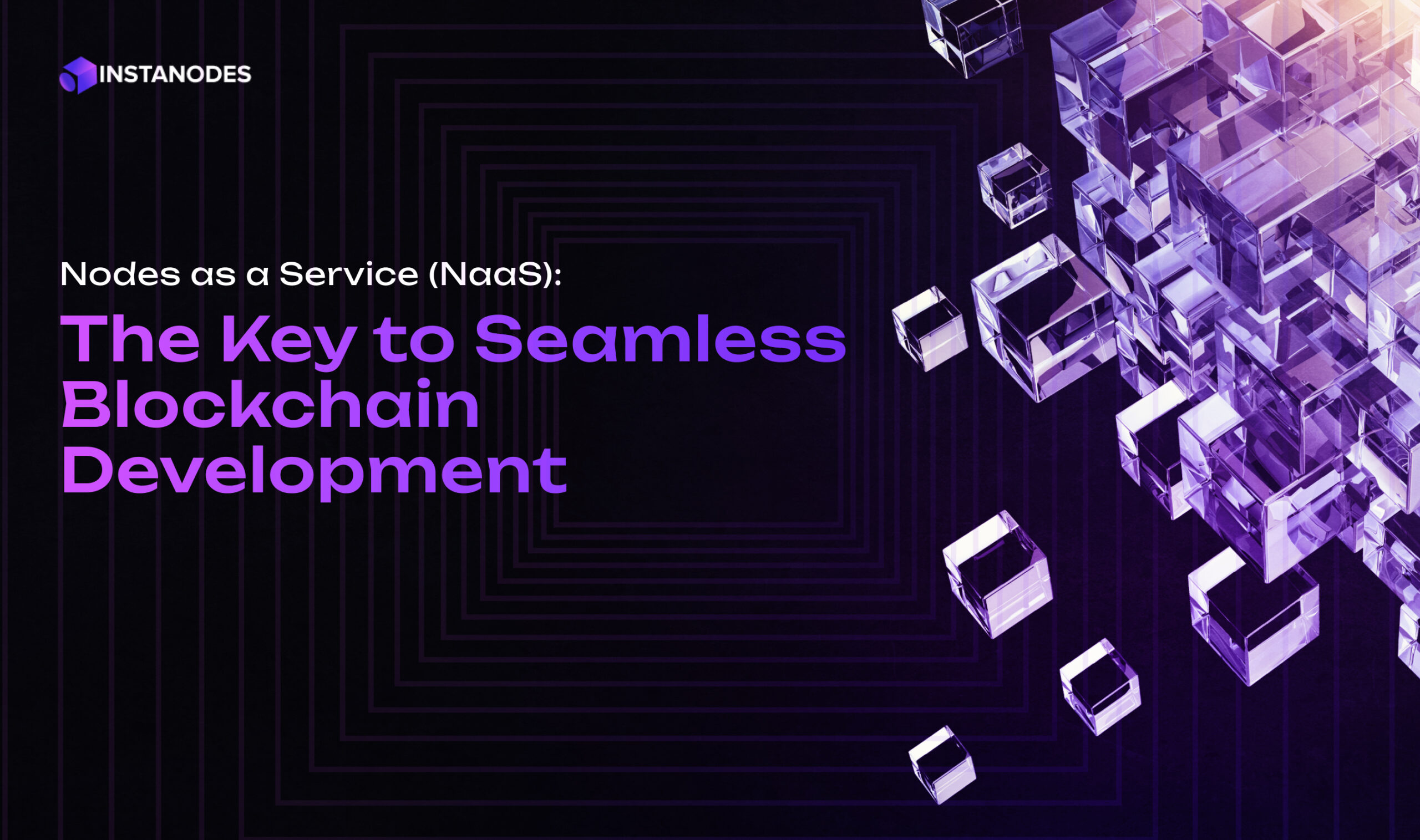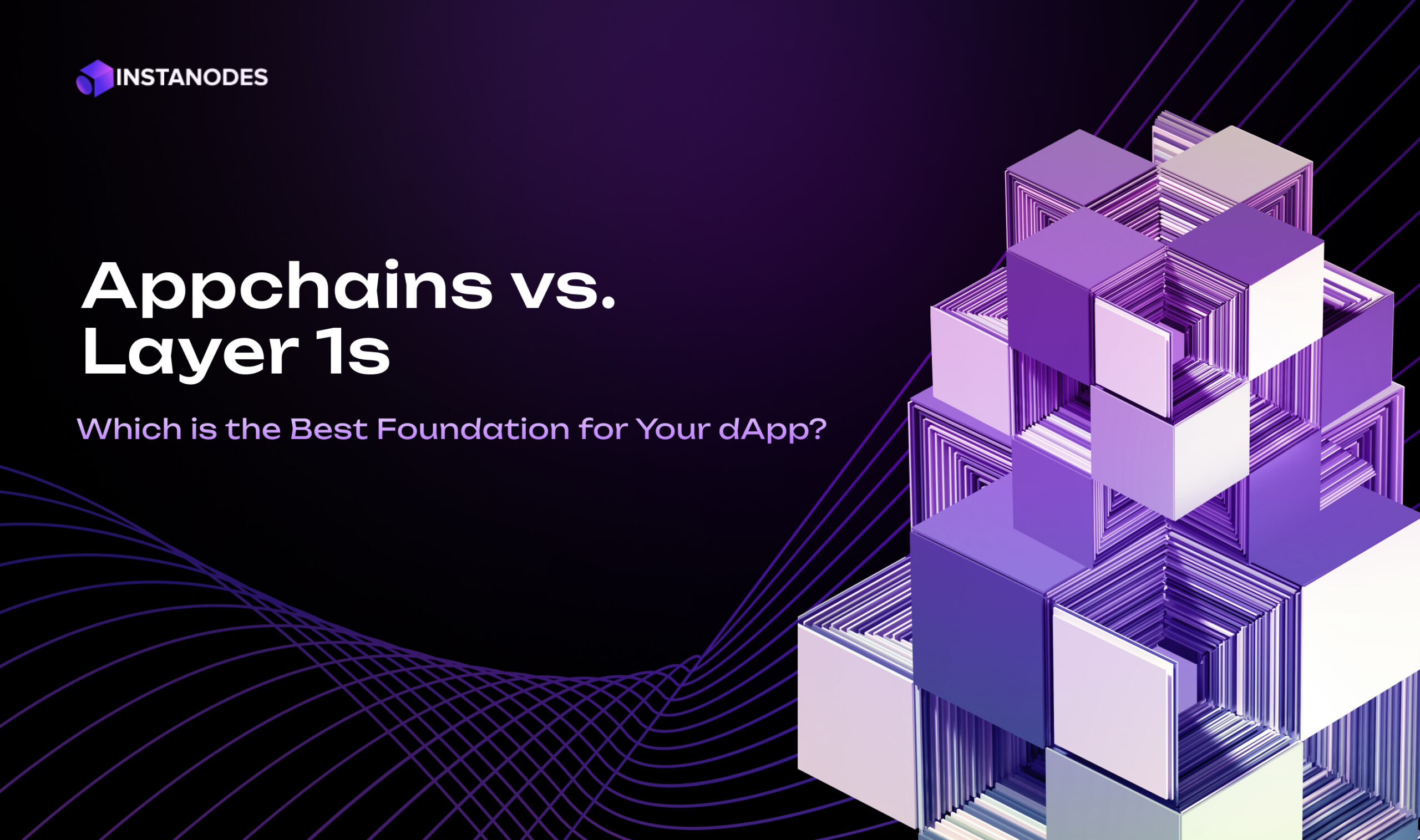Something interesting is happening in the Web3 world. Startups that once built their applications on Ethereum and other general-purpose blockchains are now striking out on their own, launching dedicated application specific blockchain networks tailored specifically to their needs.
Take gaming companies, for instance. They’re tired of competing with DeFi traders for block space, watching their users abandon games because a single transaction takes minutes to confirm during network congestion. Meanwhile, DeFi protocols are realizing they need specialized financial primitives that simply don’t exist on chains designed to serve everyone and no one in particular.
This shift isn’t just about technical preferences. It represents a coming-of-age moment for the blockchain industry. The early days of “build everything on Ethereum” are giving way to a more nuanced understanding that different applications have fundamentally different requirements. A social media platform needs lightning-fast interactions and can tolerate some eventual consistency. A derivatives trading platform needs rock-solid finality and complex financial logic. Trying to serve both on the same infrastructure means compromising on what each really needs.
The result? We’re seeing a wave of startups embrace what’s known as the application chain approach, building their own specialized blockchain networks that can be optimized from the ground up for their specific use case.
The Shortcomings of General-Purpose Blockchains for Specialized Web3 Applications

General-purpose blockchains such as Ethereum, although groundbreaking in laying the groundwork for decentralized applications, were built with wide-ranging compatibility instead of performance tuning on a use case basis. This design consideration has fundamental constraints that prove increasingly challenging as Web3 apps increase in sophistication and user uptake.
Performance Bottlenecks and Resource Competition
The most immediate limitation manifests in performance constraints. General-purpose chains have to support various types of transactions, ranging from straightforward token transfers to advanced smart contract interactions, resulting in a lowest-common-denominator environment in which no one type of application can do its best. A gaming app that needs real-time interactions is competing with DeFi protocols that are carrying out sophisticated trading strategies for block space, producing uncertain transaction fees and confirmation times that can greatly affect user experience.
Governance Misalignment and Decision-Making Conflicts
Governance presents another significant challenge for startups operating on general-purpose chains. Protocol updates, fee schedules, and technical roadmaps are by default decided by general community agreement instead of the particular requirements of any individual application. This implies a gaming startup may have different requirements of quicker block times than a DeFi protocol requiring stronger finality guarantees, making both sides settle for their best configurations.
Launch Your Appchain in Minutes — Start Building Now
Empower your Web3 startup with scalable, sovereign, and interoperable appchain infrastructure.
Economic Inefficiencies and Unpredictable Costs
The shared resource paradigm of general-purpose blockchains similarly introduces economic inefficiencies for startups with deterministic usage profiles. Applications are forced to contend with dynamic fee economies in which costs can skyrocket unpredictably during peak network utilization, making it problematic to provide stable user experiences or ensure predictable operating expenses. This unpredictability of operating costs introduces special challenges to consumer applications in which users demand stable, predictable interactions.
Technical Constraints and Architectural Limitations
In addition, general-purpose chains tend to restrict the kinds of consensus mechanisms, virtual machines, and execution environments exposed to developers. These technical constraints may cause startups to design their apps to fit the capabilities of the blockchain instead of optimizing the blockchain for the needs of their app, sacrificing performance, security, or functionality in the process.
How Application Specific Blockchains Solve Scalability Bottlenecks
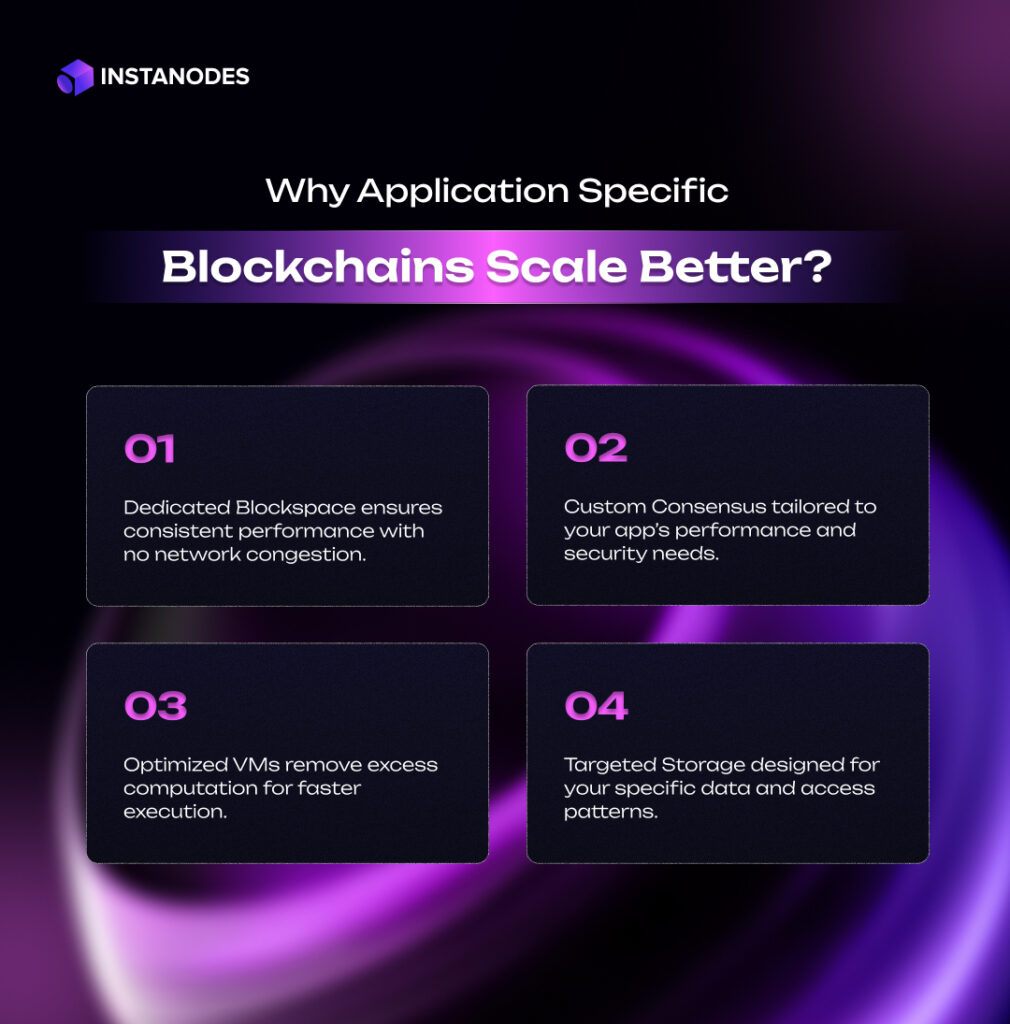
Application specific blockchain solves scalability issues by specialized optimization that general-purpose chains cannot accomplish. By building the entire blockchain system with a focus on a particular application’s needs, startups are able to bypass the performance bottlenecks that are part of common, multi-purposes networks.
Dedicated Resource Allocation and Eliminated Competition
The most significant scalability improvement comes from eliminating resource competition. An application chain dedicated to a gaming platform doesn’t need to compete with DeFi transactions for block space, allowing for consistent throughput and predictable transaction costs. This dedicated resource allocation enables startups to design their applications knowing they have guaranteed network capacity, leading to more reliable user experiences and better application performance.
Consensus Mechanism Optimization for Specific Use Cases
Consensus mechanism optimization represents another crucial advantage of application-specific blockchain architectures. Different applications have varying requirements for finality, security, and throughput. A social media platform might prioritize fast confirmation times with eventual consistency, while a financial application might require stronger immediate finality guarantees. Application chains allow startups to select or design consensus mechanisms specifically tailored to their security and performance requirements rather than accepting the generic approach of general-purpose chains.
Custom Virtual Machine Design and Computational Efficiency
Custom virtual machine design further enhances scalability by eliminating unnecessary computational overhead. General-purpose blockchains need to accommodate various programming languages, execution platforms, and types of smart contracts, leading to computation bloat that degrades performance. Application specific blockchain can use lean virtual machines specially tuned for their specific application, with a huge increase in transaction volume and a decrease in latency.
Targeted State Management and Data Structure Optimization
State management optimization provides additional scalability benefits by allowing an application chain to structure its data storage and retrieval mechanisms specifically for their use case. Gaming applications can optimize for rapid state changes and real-time updates, while financial applications can prioritize transaction history integrity and audit trails. This targeted approach to state management eliminates the storage and computation overhead associated with supporting diverse application types on a single chain.
The Technical Advantages of Application Chains Over General-Purpose Networks
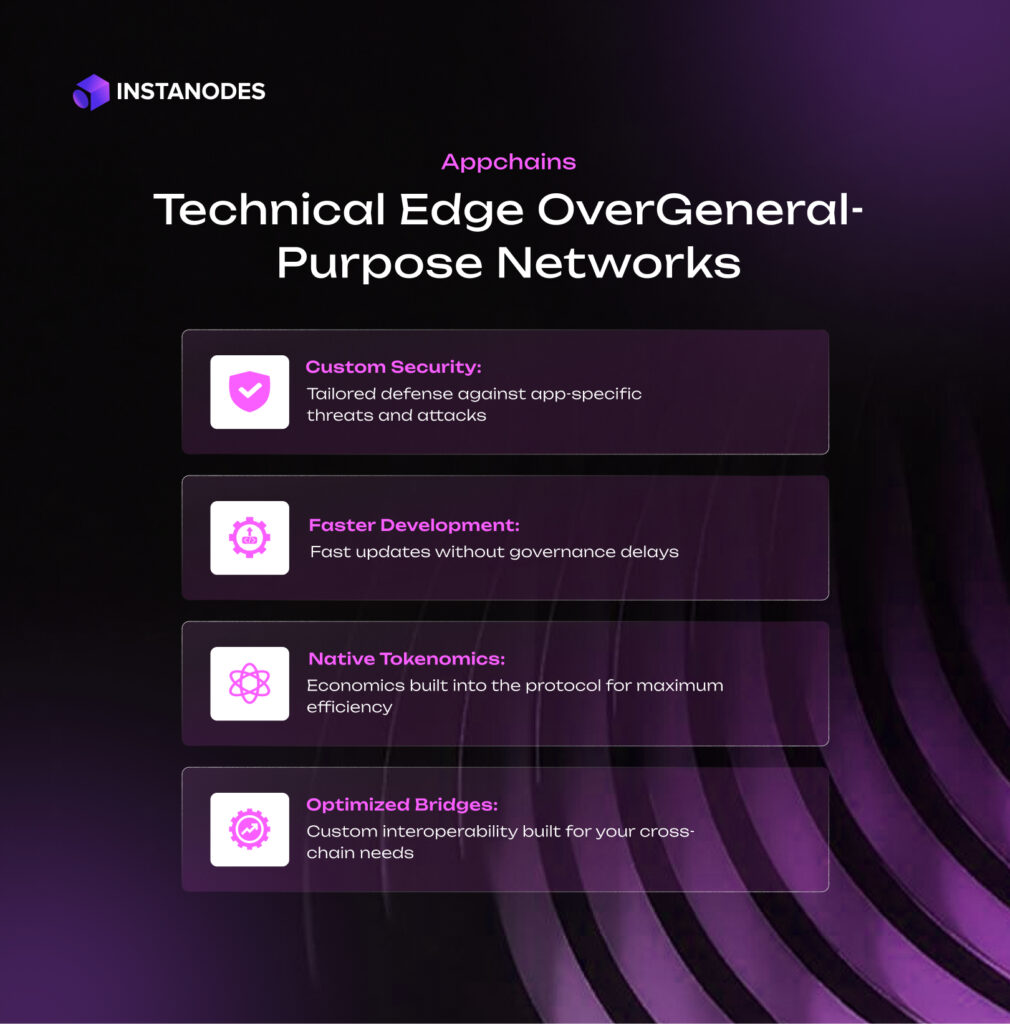
The technical superiority of application chain architectures extends far beyond simple performance improvements, offering startups fundamental advantages in security, development flexibility, and operational control that general-purpose blockchains cannot match.
Customized Security Models and Threat Protection
Security customization represents a primary technical advantage of application specific blockchain implementations. Various applications have different threat models and risk profiles that demand customized security solutions. A decentralized exchange would need strong defense against front-running and manipulation attacks, whereas a gaming platform may need defense against cheating and asset duplication. Application chains allow startups to deploy security controls specifically crafted for their threat profile instead of using generic security models that might be unsuitable for their particular risks.
Enhanced Development Velocity and Reduced Dependencies
Development velocity increases significantly when building on application chain architectures due to reduced complexity and eliminated dependencies on external protocol decisions. Startups can iterate rapidly on their blockchain infrastructure, implementing new features and optimizations without waiting for broader community consensus or navigating complex governance processes. This agility proves particularly valuable in competitive markets where rapid feature deployment can provide significant advantages.
Native Tokenomics Integration and Economic Efficiency
Custom tokenomics implementation offers another technical advantage that general-purpose chains cannot provide. Application chains enable startups to craft natively integrated token mechanisms that blend with their application logic and produce more efficient, task-oriented economic models. Instead of developing sophisticated smart contracts on top of generic blockchain plumbing, startups can actually integrate their economic mechanisms into the protocol layer, enhancing efficiency and lessening possible attack points.
Purpose-Built Interoperability and Cross-Chain Communication
Interoperability design becomes more sophisticated with application specific blockchain architectures, as startups can implement bridging and cross-chain communication protocols specifically optimized for their use case. Rather than relying on generic bridge solutions that serve all applications equally poorly, application-specific blockchain solutions can create targeted interoperability mechanisms that maintain security while enabling efficient cross-chain operations tailored to their specific requirements.
Specialized Data Solutions and Storage Optimization
The ability to implement custom data availability and storage solutions provides additional technical advantages for applications with unique data requirements. Media-heavy applications can optimize for content storage and retrieval, while financial applications can implement specialized audit trails and compliance features. These customizations would be impossible or highly inefficient on general-purpose blockchain networks.
Startups Go Sovereign with Application-Specific Blockchains
The sovereignty afforded by application specific blockchain architectures is arguably the most significant benefit for ambitious Web3 startups to establish long-term, sustainable businesses. This sovereignty exists in multiple dimensions, from technical governance to economic autonomy, radically altering how startups can work with blockchain-based business models.
Deploy Your Sovereign Web3 Stack — Talk to an Expert
Future-proof your Web3 startup with the power of application specific blockchain
Complete Governance Autonomy and Rapid Decision-Making
Governance autonomy enables startups to make fast decisions regarding their blockchain foundation without going through cumbersome community governance procedures or waiting for wide consensus on protocol improvement. This autonomy is essential to preserve competitive edge and react to market needs or security issues in a timely manner. Startups can apply emergency patches, roll out new functionality, or change economic parameters independently based on their business needs instead of wider ecosystem factors.
Economic Independence and Value Retention
Economic sovereignty through application chain architectures allows startups to realize the complete value of their blockchain infrastructure without paying continuous fees to general-purpose chain validators and infrastructure suppliers. Through running their own validator networks or delegated proof-of-stake systems, startups are able to keep transaction fees, staking rewards, and other economic benefits created by their applications. Economic alignment generates sustainable business models in which application success is directly proportional to blockchain infrastructure profitability.
Full Technical Control and Innovation Freedom
Technical sovereignty gives startups full ownership of their technology stack, including consensus mechanism through to virtual machine implementations. This gives them maximum ability to optimize and innovate without outside restriction, with the freedom to try out latest blockchain technologies or apply proprietary optimizations that give them competitive edges. Having the freedom to tweak any part of the blockchain protocol offers startups novel flexibility in adjusting to evolving market conditions or user needs.
Brand Control and Customized User Experience
Brand and user experience sovereignty allows startups to create completely customized blockchain experiences that align with their brand identity and user expectations. Rather than forcing users to interact with generic blockchain interfaces or wallet solutions designed for broad compatibility, application chains enable startups to create seamless, branded experiences that abstract away blockchain complexity while maintaining decentralization benefits.
Regulatory Flexibility and Industry-Specific Compliance
The sovereign approach also allows startups to implement industry- or geographic-market-specific compliance and regulatory functionality without impacting other applications or holding up general-purpose chain compliance solutions. Such regulatory agility is especially useful for startups in highly regulated domains such as finance or healthcare, where certain compliance demands may contradict the wide anonymity.
Conclusion
Making a shift from general-purpose blockchains to application specific blockchain enables any enterprise to serve the real users in a better way. Using a shared blockchain infrastructure might be easy and cost-effective, but it comes with certain limitations, ranging from performance bottlenecks to governance constraints.
Application chain architectures offer compelling solutions to these challenges through targeted optimization, technical sovereignty, and economic alignment that general-purpose blockchains cannot match. By embracing application-specific blockchain approaches, startups gain the flexibility to optimize every aspect of their infrastructure for their unique requirements while maintaining the decentralization and security benefits that make blockchain technology valuable.
Ready to launch your own application specific blockchain? Instanodes provides the infrastructure and expertise you need to deploy and scale your appchain solution. Come, let’s talk!

